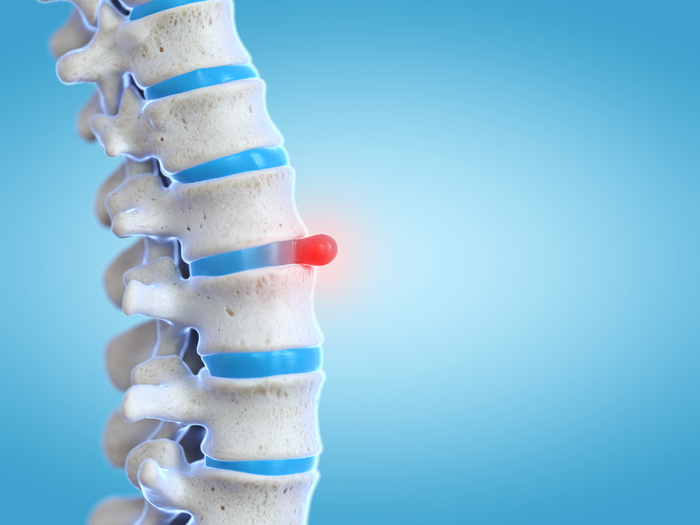Slipped Disc Treatment & Diagnostics in Tardeo, Mumbai
Slipped Disc
Our vertebral column is made of multiple interconnected discs of bone that are stacked upon one another. Inside the vertebrae, a soft material named nucleus pulposus surrounds the spinal cord and the nerves. The nucleus pulposus is fluidic and contains a loose network of collagen fibres within the core.

What do we need to know about slipped discs?
As the nucleus pulposus helps to withstand compression and torsion on the vertebral column, any damage caused by a large/sudden force can cause the fluid to leak through ruptured bones. The slipped disc presses on the nerve in the lower back, causing pain, discomfort, numbness or uneasiness in the form of aching back, leg, foot, hips, etc.
To seek treatment, you can search online for a pain management doctor near me or a pain management hospital near me.
What are the symptoms of slipped discs?
A slipped disc could occur at any portion of your spine, from neck to the lower back, but the lower back is most prone to it. It can put excess pressure on the muscles and the lower back in this region. Other common symptoms of a slipped disc are:
- Lower back pain
- Aches that travels to arms/legs
- Pain while standing or sitting
- Stinging pain when walking
- Tingling, aching, burning sensation in the slipped disc area
- Nerve root pain
- Inflammation
- Asymptomatic (some people experience prolapsed disc with minor/no symptoms)
What causes slipped discs?
A slipped disc could have different causes, depending on the progression of the prolapse. It could either be sudden, or gradual.
Sudden:
- Falling and landing on your buttocks from a significant height can exert a strong force across the spine, which can fracture a vertebral bone or rupture a disc, thus causing a slipped disc.
- Lifting an object that is too heavy, or bending forward to lift extremely heavy items may exert a force that can rupture a disc
Gradual:
- Sitting in the same position without moving for longer durations can cause a slipped disc
- Being overweight, having a sedentary lifestyle and weak muscles can also cause this ailment.
When should you consult a doctor?
If you experience the symptoms mentioned above, and if they persist for more than a week, you should consult a doctor. A vertebral disc prolapse specialist in Mumbai can help you diagnose and treat your slipped disc effectively, and ensure speedy recovery.
You can request an appointment at Apollo Spectra Hospitals, Tardeo, Mumbai.
Call 1860 500 2244 to book an appointment.
How is a slipped disc diagnosed?
A physical examination helps a doctor diagnose a slipped disc. Tests such as X-rays and MRI scans are advised, if the symptoms do not go away on their own. These tests can help in locating the site of the prolapsed disc and the size and provides further data for consideration of a surgery.
In some cases, as the disc prolapse can be asymptomatic, and lower back pain can be considered fairly common, MRI scans are highly recommended.
How is a slipped disc treated?
Some of the vertebral prolapses settle on their own as their symptoms disappear within 6-7 weeks for some patients. Regardless of this, extra caution needs to be taken, as you will need to take care of your vertebrae to avoid exacerbating the problem.
Anti-inflammatory medication is prescribed along with paracetamol-based medicines, combined with a physiotherapeutic regime. Hydrotherapy and pilates are also recommended.
But if a patient does not respond to conservative treatment, interventional procedures such as nerve sheath injections are required. Surgical procedures have shown to speed up the recovery, following a disc prolapse.
Conclusion
The radiological findings, symptoms, severity and all other factors are considered when treating a vertebral prolapse. A neurosurgeon or a spinal surgeon is well equipped to provide you with an effective treatment program, based on your situation and severity.
Activities that involve sitting for a prolonged period of time or slouching and bending should be avoided. Patients should also refrain from sweeping, vacuuming, doing laundry and doing strenuous exercises and gardening.
A slipped disc takes approximately 4-6 weeks (1 month) to heal on its own when the prolapse has occurred at a minor level. If the condition is severe, then it might not heal on its own. Medical intervention by a vertebral disc prolapse specialist would speed up the process.
For non-surgical treatment of slipped discs, alternatives such as physical therapy have shown improvements over a period of time. If the pain obstructs physical therapy, epidural steroid injections can help in pain reduction.
Our Top Specialities
NOTICE BOARD
CONTACT US
CONTACT US
 Book Appointment
Book Appointment


.svg)
.svg)
.svg)
.svg)








